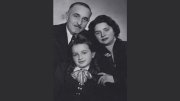When the nazis occupied Hungary and began deporting the country’s Jews to Auschwitz, Susan Rubin Suleiman and her parents assumed Christian names and began a life in hiding in Budapest. Following the subsequent Communist takeover, they emigrated through Vienna, Paris, and Haiti to the United States. Now, through family objects and memories, the Dillon professor of the civilization of France and professor of comparative literature emerita excavates the European girlhood she was forced to leave behind, in the compact Daughter of History: Traces of an Immigrant Girlhood (Stanford, $25). From the prologue, “The Silver Pin,” is about one of those evocative memorabilia and its resonance through generations:
She had pinned it on the collar of her black dress for the formal photo: a silver flower long and slender, the sculpted leaves spreading on both sides of the stylized petals, with two symmetrically placed pearls in the middle. Today, it has little or no commercial value; the pearls are slightly yellowed, and if one looks closely one sees many imperfections on their surface. But back then, in Budapest, whenever I saw my mother wearing it, I thought of it as a precious thing. My father gave it to her shortly before the photo session, a sign of prosperity and survival. And of love, too….They had married for love, against his father’s wishes, had survived the war with their only child, and soon they would be seeking a new life, far away from the world they knew. Even in my adolescent rages against them, I had to admit they did not lack courage or pluck.
That last photo session in Budapest took place in the spring of 1949, a few months before we left Hungary. Mother had curled my hair for the occasion, in long corkscrew curls that hung down to my shoulders, and she too had been to the hairdresser. I can imagine her thinking, Capture this moment before we turn our back on it. I was nine years old. Five years earlier, we had been hiding from the Nazis in a house in Buda, with false papers, false names. But that too was behind us now.
Nessa, my five-year-old granddaughter, has been exploring the wooden box on top of my dresser in which I keep earrings and a few odd pieces of jewelry. When she finds the silver pin, she turns to me: “Why don’t you ever wear this, Immy? It’s pretty.” Pins are for dressing up, I tell her, and in these days of the corona (as she calls it), we don’t dress up much. But suddenly I have an idea. “Here is a little test for you.” A test? Her eyes sparkle….Pin in hand, we stand in front of the family photos I have hung in the hallway. “Look carefully at the picture of me and my parents. Do you see this pin anywhere?” The picture shows the three of us, Lilly and Miklós seated close to each other and me between them. It’s high up on the wall; Nessa needs a stepping stool. She climbs on it, looks up, straining to see. “Your mom was wearing it!” she exclaims triumphantly.









